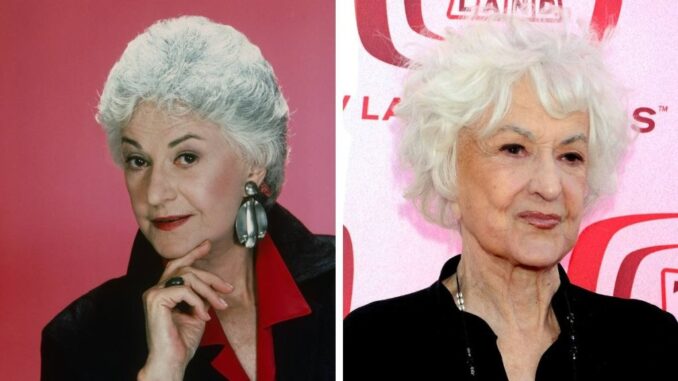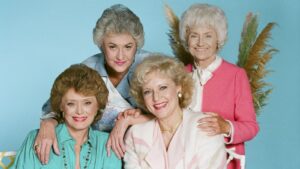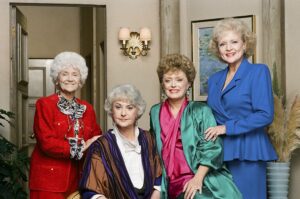
“The Golden Girls,” a groundbreaking sitcom that aired from 1985 to 1992, not only became a cultural phenomenon but also set a new standard for the portrayal of older women on television. The show, created by Susan Harris, featured a stellar cast that brought to life the stories of four remarkable women navigating life, love, and friendship in their golden years. In this article, we will explore the main cast members, their characters, and the unique chemistry that made “The Golden Girls” a timeless classic.
The Main Cast
Bea Arthur as Dorothy Zbornak

Bea Arthur portrayed Dorothy Zbornak, the quick-witted and often sarcastic teacher who served as the voice of reason among her friends. Dorothy was known for her sharp tongue and no-nonsense attitude, often delivering comedic one-liners that became iconic. Arthur’s portrayal of Dorothy was not only hilarious but also heartfelt; she expertly balanced humor with moments of vulnerability, making her character relatable to viewers of all ages.
Before “The Golden Girls,” Bea Arthur had already made a name for herself in television with her role in “Maude.” Her strong stage presence and comedic timing made her a natural fit for the role of Dorothy. The character quickly became a fan favorite, showcasing Arthur’s ability to tackle serious topics while maintaining a comedic edge.
Betty White as Rose Nylund
Betty White’s portrayal of Rose Nylund, the sweet and somewhat naïve woman from St. Olaf, brought a unique charm to the ensemble. Rose’s innocence and quirky anecdotes often provided comic relief, contrasting with Dorothy’s sharp wit. White’s impeccable comedic timing and ability to play the lovable yet oblivious character endeared her to audiences.
Betty White’s career spanned several decades before “The Golden Girls,” including notable roles in “The Mary Tyler Moore Show.” Her warmth and genuine spirit shone through in her performance as Rose, solidifying her status as a television legend.
Rue McClanahan as Blanche Devereaux

Rue McClanahan played Blanche Devereaux, the glamorous and flirtatious Southern belle with a penchant for romance. Blanche’s confidence and sass brought a different dynamic to the group, often leading to hilarious situations. McClanahan’s portrayal of Blanche was both bold and nuanced, capturing the character’s complexity beyond her flirtatious exterior.
Before joining “The Golden Girls,” Rue McClanahan had a successful career in television and theater, including a role in “Maude” alongside Bea Arthur. Her chemistry with the cast, particularly her playful banter with Dorothy, added depth to the show’s humor.
Estelle Getty as Sophia Petrillo
Estelle Getty portrayed Sophia Petrillo, Dorothy’s sharp-tongued mother who often stole the spotlight with her witty remarks and stories from her past. Sophia’s character was a standout, providing a unique blend of wisdom and humor. Getty’s performance was characterized by her ability to deliver punchlines with impeccable timing, making Sophia one of the most beloved characters on the show.
Interestingly, Estelle Getty was actually younger than Bea Arthur, but her portrayal of the elderly Sophia was so convincing that it became iconic. The dynamic between Dorothy and Sophia, filled with love and playful rivalry, added a touching layer to their relationship.
On-Set Chemistry
The chemistry among the cast members was a key factor in the show’s success. Their genuine friendships off-screen translated into authentic interactions on-screen, creating a believable and heartwarming portrayal of friendship. The ensemble cast shared a deep bond, which was evident in their comedic timing and the way they played off each other.
A Strong Support System
The actresses often spoke about the supportive environment on set. Bea Arthur, known for her no-nonsense approach, was also a caring figure to her co-stars. Betty White, with her infectious positivity, often lifted the spirits of the cast and crew. Rue McClanahan’s playful nature brought levity to the set, while Estelle Getty’s warmth created a sense of family among the cast members.
Their camaraderie was palpable, contributing to the show’s genuine depiction of friendship. The bond they shared extended beyond the studio, often spending time together outside of work and attending events as a group.
Behind the Scenes
The success of “The Golden Girls” was not just due to the cast’s individual talents but also their collaborative spirit. The writers crafted storylines that allowed each character to shine, and the actresses brought those scripts to life with their unique interpretations. The ensemble nature of the show meant that each character had their moments to shine, resulting in a rich tapestry of humor and emotion.
The cast’s ability to improvise and play off each other’s strengths added an extra layer of authenticity to the performances. Many of the show’s most memorable moments came from spontaneous interactions and banter, showcasing the chemistry that made the show so beloved.
Cultural Impact and Legacy
“The Golden Girls” broke new ground in television by addressing issues related to aging, friendship, and the complexities of life in a way that had never been done before. The show tackled topics such as love, loss, and sexuality with humor and grace, resonating with audiences of all ages. Each character brought a unique perspective to the group, reflecting the diversity of women’s experiences.
The legacy of “The Golden Girls” endures today, inspiring new generations of viewers. The show has remained relevant through reruns, streaming platforms, and a dedicated fanbase. Its themes of friendship, empowerment, and resilience continue to resonate, reminding audiences of the importance of connection and support in life.
Conclusion
“The Golden Girls” remains one of the most cherished sitcoms in television history, thanks to the incredible talents of its cast and their undeniable chemistry. Bea Arthur, Betty White, Rue McClanahan, and Estelle Getty created characters that transcended stereotypes, showcasing the richness of life in one’s golden years.
The show not only entertained but also opened doors for conversations about aging and women’s empowerment. As fans celebrate the legacy of “The Golden Girls,” they continue to be reminded of the enduring power of friendship and the laughter that comes from life’s shared experiences. The friendships formed both on and off-screen have left a lasting impact, ensuring that “The Golden Girls” will forever hold a special place in the hearts of audiences everywhere.
